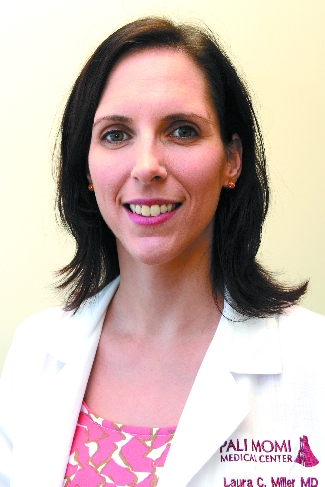Managing Seizures In Pregnancy
Dr. Laura Miller
Adult neurologist at Pali Momi
Where did you receive your schooling and training?
I received my schooling at State University of New York at Buffalo School of Medicine. I did all of my training in Boston at Beth Israel Deaconess Medical Center.
How long have you been in practice?
Five years.
What is your specialty?
I am interested in women’s issues in neurology. I have advanced training in epilepsy. During my fellowship, I spent the bulk of my time working with pregnant women with epilepsy. I also have board certification in headache medicine. Headaches are much more common in women than they are in men, for hormonal reasons.
In what ways do you help pregnant women who have epilepsy?
There are obvious concerns about the exposure of the fetus to medications. The goal is to minimize any potential risk for birth defects, but we also need to manage the risk for seizures, which could be detrimental.
What is the process involved?
First we discuss family planning, with the goal of having a planned pregnancy so that patients can have their medications and seizures under stable control prior to conception. Then we work on a one-to-one basis to find the best medication regimen that controls their seizures. We monitor how they’re doing on the medicine, often using blood tests. Then, throughout pregnancy, we can make adjustments to the medications and check the blood tests again to ensure we’re keeping enough of the seizure medication in the patient’s system. When you’re pregnant, the metabolism changes quite a bit. Medication levels in the bloodstream can drop very low, increasing the risk for breakthrough seizures.
Can you talk about the hormonal changes during pregnancy that bring on headaches?
For a lot of women, with migraines in particular, there is a hormonal component to their headaches. It is not unusual to have monthly headaches triggered by menstruation. There are several different treatment options utilizing oral contraceptives that can decrease menstrual migraines. During pregnancy, a lot of women will have improvements in their headaches after the first trimester. During the first trimester, we work on non-medication ways to treat the headaches, such as nerve blocks, biofeedback and other complementary techniques to avoid excessive medication.
What are nerve blocks?
It involves using lidocaine, a local anesthetic, to block sensation from one of the nerves involved in headache propagation. For a lot of people, that will give them some temporary relief from their headaches.
Anything else you would like to add?
I have a passion for helping women with neurological issues, including but not limited to headaches and seizure disorders. With my practice here at Pali Momi, I’m proud to be one of Hawaii’s only neurologists specializing in women’s neurology and in the treatment of pregnant women with epilepsy, and we serve patients from all over the island.






